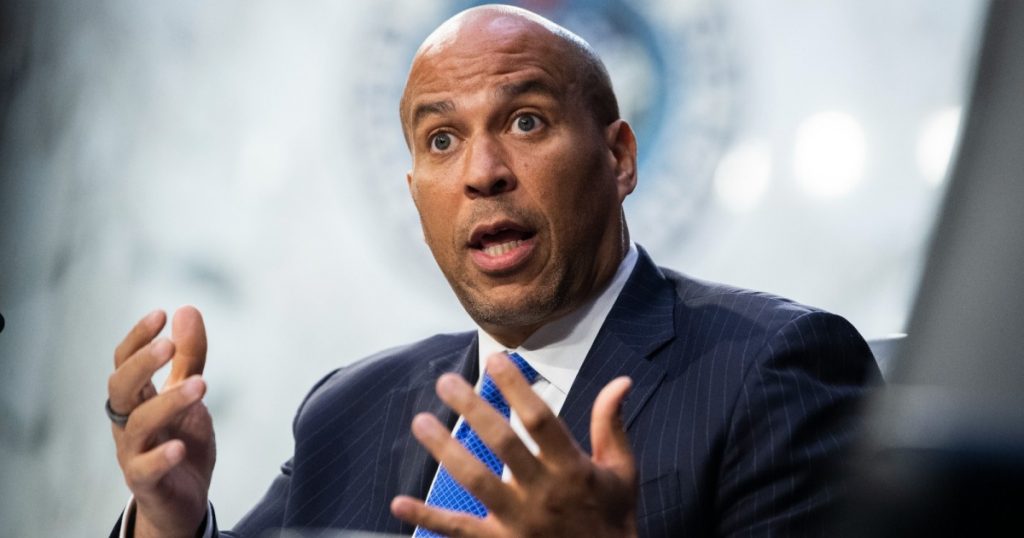Cory Booker Reveals Where Things Went Wrong With Tim Scott on Police Reform
Tom Williams/AP
Fight disinformation. Get a daily recap of the facts that matter. Sign up for the free Mother Jones newsletter.In an exclusive interview with Mother Jones, Sen. Cory Booker (D-N.J.) confirmed what many people, myself included, believe to be true: The bipartisan police reform bill fell apart because Sen. Tim Scott (R-S.C.) was resistant to sweeping changes to policing.
Q: What went wrong with the police reform bill?@CoryBooker: “We made tremendous progress…But it turned out that my Republican negotiating partner [Sen. Tim Scott (R-S.C.)] was not willing to embrace so much of the change that we had agreed upon.” pic.twitter.com/F8FvQJf6Z8
— Mother Jones (@MotherJones) October 1, 2021
“We made tremendous progress,” Booker told my colleague Tom Philpott in a livestreamed conversation on Friday. “But it turned out that my Republican negotiating partner was not willing to embrace so much of the change that we had agreed upon.”
The two senators, both Black men who’ve had plenty of negative encounters with law enforcement, had been working together to craft federal legislation that would lead to meaningful police reforms since George Floyd was killed by a white police officer, Derek Chauvin, in May 2020. As I wrote on Thursday, after negations collapsed earlier this week, Scott falsely blamed the demise on what he said is the Democrats’ desire to defund the police:
Then, as Congress was embroiled in high-stakes negotiations on keeping the government open, raising the debt limit, and voting on Biden’s sweeping agenda, the talks collapsed for good. Scott falsely announced that the problem was that Democrats wanted to defund the police. “I’m not going to participate in reducing funding for the police after we saw a major city after major city defund the police,” he said on CBS’ Face the Nation. “Many provisions in this bill that he wanted me to agree to limited or reduced funding for the police.”
Seeing as Democrats don’t want to defund the police (and Congress doesn’t have the ability to do so), I surmised that the real reason is that Scott simply did not have the political capital to get something as sweeping as bipartisan police reform done:
Unless the cops in question happen to be protecting the US Capitol from marauding Trump supporters, the GOP sees itself as the party heartily in favor of law enforcement—and so does their base. After some initial enthusiasm for the movement, support for Black Lives Matter is at an all-time low. So, what do you do when you’re trying to play the role of bipartisan negotiator while also appealing to a base that bristles at criticism of police? First, you walk the fine line. Then you abandon ship.
Scott relied on a conservative talking point that a slew of Republicans have been using since 2020’s massive racial justice protests swept the nation. It is, however, important to note that the Democratic proposal that Scott clumsily called “defunding the police” used to be embraced by the GOP:
The Democratic proposal in question included language about giving law enforcement agencies grants only after they met certain standards in bias training, no-knock warrants, and other stipulations. It’s a clear-cut case of incentivizing police departments to reform. And if this proposal sounds familiar, it’s because it’s fairly similar to a Trump executive order from June 2020 and was once a GOP position. But when you’re not serious about reforms, a Republican idea can turn into a radical leftist position swiftly.
Scott balking at a Trump idea was the final straw for Booker. “I finally said ‘enough’ when they wouldn’t even endorse the Donald Trump executive order,” he told Tom. “When that fell to the wayside, I was like, ‘You gotta be kidding me…This is not making progress.’”





